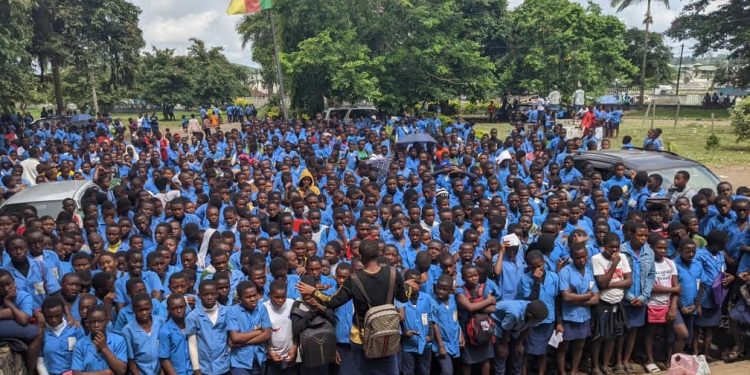Parents and teachers in Bamenda, headquarters of the North West Region of Cameroon, are expressing growing dismay over what they perceive as a decline in the standards of education.
Reports suggest that parents and teachers alike are troubled by issues ranging from inaccurately marked assignments to the qualifications and dedication of educators.
Cynthia, a concerned parent, shared her distress, citing discrepancies in her son Marcel’s arithmetic assignments.
Despite his initial academic success, Marcel’s correct answers were marked wrong by his class teacher, who allegedly asserted that 5 is not greater than 3 and 20 is not less than 30.
“I am worried because we pay huge amounts as fees in these mission schools, and they bring in just any one to teach” Cynthia said
“I am worried about the quality of education our children are getting,” she added.
Other parents echoed similar sentiments, with Collins questioning, “We used to run away from public schools to those by the mission in search for standards but now they are falling, where do we now run to?”
The root of the problem appears to be multifaceted, with many attributing it to the high rate of unemployment in Cameroon.
Individuals, often untrained, are reportedly entering the teaching profession out of necessity rather than qualification.
The proliferation of training schools for teachers with inadequate government oversight is also cited as a contributing factor.
Alfred, a teacher, bemoaned the situation, stating, “It is regrettable that a teacher is now anyone who can go to a class and animate it until closing time.”
MMI’s observations across some schools in Bamenda support the claim of declining standards.
Teachers, overwhelmed by large class sizes and irregular pay, expressed their challenges.
“How will I as a teacher not over score or underscore pupils?” said Marcelline, a teacher in Bamenda.
“I teach a class of 50 pupils from 8 am to 3pm at an irregular pay of 35.000frs a month, I need to get other teaching jobs so that my ends can meet” she added.
In a concerning revelation, MMI discovered a school in Bamenda II Subdivision where a teacher, having barely passed four Ordinary Level papers during the 2022/2023 academic year, had never received formal teacher training.
The issue extends beyond qualifications, as some teachers opt for alternative careers due to inadequate compensation.
Linus, a former teacher turned entrepreneur, emphasized the financial disparity, stating, “In just a week, I make the salary I used to earn per month as a teacher.”
In his end-of-year address, President Paul Biya acknowledged challenges within the education system, expressing concerns about a few teachers holding “our children’s education hostage.”
However, teachers argue that the government’s failure to address salary issues has contributed to the chaos.
Parents are now questioning the role of the State in ensuring quality education and emphasizing that prioritizing education is crucial for addressing broader social and security challenges in Cameroon.
“If we want future leaders, then it should start with quality teachers in all domains,” concluded Collins, echoing the sentiments of many concerned parents.
The call for urgent intervention to salvage the deteriorating educational standards in Bamenda is now louder than ever.



